
“You have to be living and breathing it every day,” says Christian Pappanicholas '98 of life in the restaurant business. He owns The Cannibal Beer & Butcher, where patrons can eat charcuterie, drink beer from all over the world, and park their bikes in the restaurant’s garden seating area.
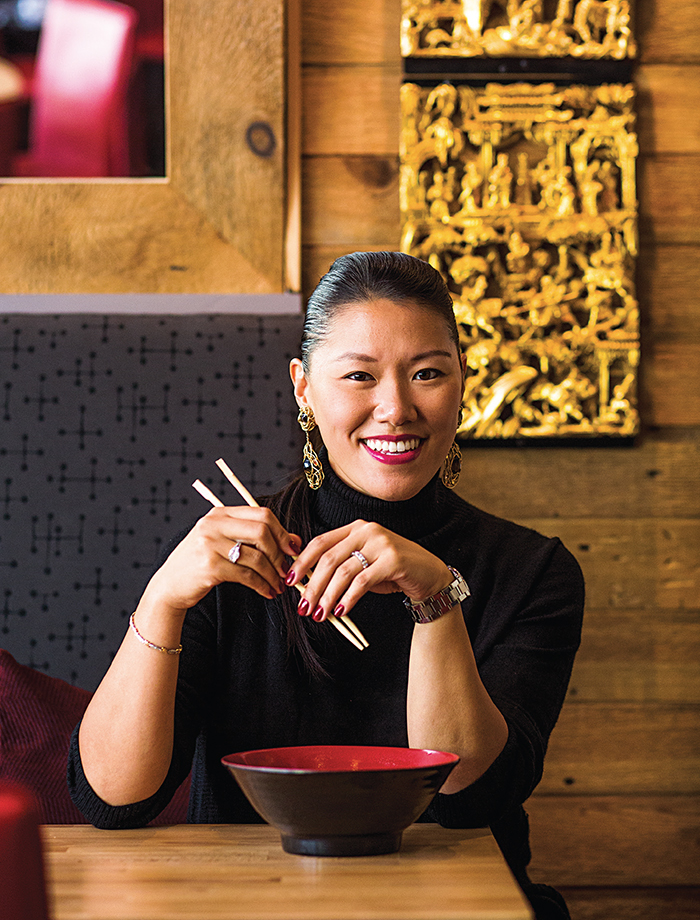
Photo: Pat Piasecki
“The food is number one,” says Nadia Liu Spellman ‘04, owner of Dumpling Daughter. “Your personal life is secondary.”
Nadia Liu Spellman ’04 still relishes the memory of the phone call.
On the line was Sheryl Julian, the grand dame of food at The Boston Globe. Julian was calling to check some facts for a pending review she was writing on Dumpling Daughter, the Chinese restaurant in Weston, Mass., that Spellman had opened last year.
The call caught Spellman by surprise. She was excited to talk with the food critic, though that quickly gave way to alarm. A review? What would it say? Her mind raced, but then Julian put her at ease. “I love, love, love, love, love your food,” Julian told her.
With those words, Spellman felt herself float. “She said it five times. I teared up. I was so overwhelmed with happiness,” says Spellman. “She is so well-respected. She made me feel legit. You feel like all your effort has been validated.” Searching for the perfect location, revising the menu, tinkering with operations, working day after day. All the restaurant demands of Spellman is everything: her time, her energy, her life. “There is very little sleep,” she says. “Even when I’m sleeping, I’m dreaming of what to do.”
But being recognized for that hard work was satisfying. On the wall of her restaurant, Spellman proudly displays Julian’s review: “Dumpling Daughter’s Chinese Food Is Exquisite.”
Celebrities and Lobster Rolls
To run a restaurant well, restaurateurs must master everything that goes into a guest’s visit. “It demands sensitivities to all the senses,” says Gherardo Guarducci ’88, P’17. “Taste buds, your vision. You have to be an expert in all things. Sound. How things look. How things feel. You are close to a movie director, or an artist of some sort. On top of all that you have to be a good businessman. A successful restaurateur is as close to being a Renaissance man as you’ll find in the business world.”
Guarducci ought to know. He is the principal owner of a fleet of fine-dining restaurants in New York City and Southampton, N.Y. His Regency Bar & Grill is the home of a power-dining scene at the Loews Regency Hotel. Italian food is the specialty at Felice, Sant Ambroeus, and Casa Lever, the latter of which attracts some well-known patrons, including former President Bill Clinton, whose visits require a security sweep in advance of his arrival. Some famous guests, notes Guarducci, have specific requests on how hidden or conspicuous they want their table. “It can be more out of the way, or more in the way,” he says. “It depends on the celebrity.” On the wall at Casa Lever hang about 30 Andy Warhols on loan from private collections. They’re worth close to $100 million.
In total, Guarducci’s restaurants have 11 locations. Their back-of-house operations, which are run out of a central office of 30 bookkeepers, managers, and marketers, is where Guarducci starts his days. Then for lunch and dinner he does a sweep of his restaurants. He eats in his establishments every day. “I have a tough time eating in other restaurants,” he admits. “The quality that my restaurants provide is the quality I want. I’m quite difficult to please.” Guarducci collaborates with his chefs on the menus, and he often hires chefs from Italy to invigorate the food offerings.
A common link among many alumni restaurant owners is that they grew up in families who value the importance of good food and eating together. Guarducci’s father was a busy man, an entrepreneur in the textile industry, but at mealtime the entire family, including Guarducci and his five siblings, sat down and ate together. The future restaurateur grew up in Tuscany in Italy, and his family ate the best of local produce, game, and catches from the sea. “It’s from the ground to your mouth, from the sea to your mouth, from the woods to your mouth,” he says. He credits his upbringing with helping him understand what good food should be.
Guarducci came to the U.S. to attend Babson, and in the early 1990s he began opening a string of upscale sandwich shops, seven in total, in Manhattan, Phoenix, and London. The shops offered Guarducci his first foray into the food industry and served as a gateway to the more fancy restaurants he started opening about 10 years ago. Having now made a career in the industry, Guarducci calls restaurants an “honest business.” Restaurateurs can’t fake good food or service, he says, noting the high failure rate of new restaurants. “It is an honest business in judging you quickly,” he says. “You won’t survive unless you’re good.”
Paul Barker, MBA’94, owns Pauli’s, a Boston sandwich, wrap, and pasta restaurant that he opened in 2011. He cautions those who fantasize about opening a cafe. “People have these dreams,” he says, “but they don’t research it enough. It’s not something you just walk into. You need to have some experience, and you need to be passionate about it.” Barker also points to the substantial initial investment required to open an eatery. “There are businesses you can start out of a basement and have a great potential for growth,” he says. A restaurant isn’t one of them.
Barker grew up in the food business. His grandfather, father, and uncle all owned grocery stores in Boston’s North End. His mother also opened a restaurant, Nicole’s, in the historic Italian neighborhood. Barker’s grandfather taught him how to count money as a little boy, and, as Barker grew older, he rang up customers and waited on those needing meats, olives, and cheeses. “It’s something you grow up in,” Barker says. “You become familiar with how to operate a business. It’s almost like a family internship.”
Barker enjoyed working with food, but he saw the downside as well, how his family worked weekends and long days. “When I was younger, I said I would never go into the food business,” he says. For 10 years, Barker worked in sales but then realized he didn’t want to spend his life climbing the corporate ladder. Gravitating back to food, he first opened an Italian fast-food eatery in Hanover, Mass., and then a sandwich and catering business in Boston’s Financial District. Both proved successful before he eventually sold them. After working as a consultant in the food industry for a stretch, Barker opened Pauli’s, known for its lobster rolls and creative, gut-busting sandwiches.
Before Barker launched each of his food ventures, his mother sat him down for a talk. She gave him her full support, telling him she wasn’t worried that the businesses would be unsuccessful. Still, she had one concern. “She’d ask me if I really considered all the time commitments,” he says. “She was worried if I would have personal time, family time.”
Barker hadn’t forgotten the long days his parents used to work. Now a father with children ages 10 and 14, he has hired trusted managers to run Pauli’s in his absence. He only stays late to close shop two nights a week, giving him time to help with homework and coach his children’s sports teams. “I am very involved with their lives,” he says.
99 Percent Confidence
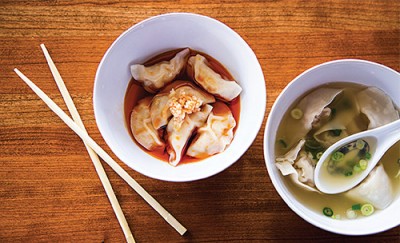
Photo: Pat Piasecki
Dumpling Daughter
Dumpling Daughter’s Spellman also grew up in the food business. In the 1980s, her parents opened Sally Ling’s. Named for Spellman’s mother, it became the first fine-dining Chinese restaurant in Boston. Many a Chinese New Year and family celebration were held there, though Spellman was happiest eating her mom’s cooking at home with her family. Many of those meals, including dumplings, buns, and her grandmother’s meat sauce over spaghetti—what Spellman calls her “comfort food”—form the heart of Dumpling Daughter’s menu, as do a few Sally Ling favorites such as cucumber salad and wonton soup. “It’s a very personal menu,” Spellman says.
Years passed before Spellman actually opened her own restaurant. The first obstacle was her parents. “They didn’t want me to do it,” Spellman says. “They said, ‘It’s really tough. Don’t feel like you have to follow in our footsteps.’” So after graduating from Babson, Spellman moved to New York and took a job in finance. She used her paychecks to eat out in the city as often as she could; reading The New York Times food section, she searched for the best burger, the best seafood, the best service, the best of whatever she could find. And on the nights she didn’t eat out, she hosted dinner parties, attended potlucks, and experimented in the kitchen.

Photo: Pat Piasecki
Dumpling Daughter
Spellman ultimately realized that she couldn’t escape food as a career. “I just love food,” she says. “I just love the business.” In 2008, she began working on weekends at Sally Ling’s, which her mom had relocated to Fort Lee, N.J., and the following year she quit her job in finance. At Sally Ling’s, she learned everything about running a restaurant. By 2010, Spellman moved back to the Boston area, feeling ready to open her own place.
Now the hard work began. Spellman spent a year fine-tuning a business plan and the menu, which went through more than 20 iterations. To simplify operations, she decided against offering full service or a bar. As for a location, the exhaustive search focused first on high-traffic areas. Spaces were hard to find due to slow turnover, but Spellman finally landed a potential location in Cambridge’s Kendall Square. To satisfy the demanding landlord, she spent $20,000 in fees for an attorney, architect, and engineer as she prepared to sign the 50-page lease, which would be for 10 years. The build-out of the site would cost $750,000.
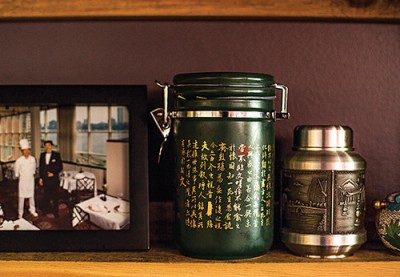
Photo: Pat Piasecki
Dumpling Daughter
The day before she was set to sign, Spellman and her mother took a last look at the space. “Are you more than 50 percent afraid to sign the lease?” her mom asked. “You need to be more than 50 percent excited and comfortable, not scared.” Spellman had her doubts. She wasn’t sure if she could sell enough food there to pay her expenses. “I’m about 80 percent scared,” she replied. Her mother told her to pull out. “You lost $20,000,” she said, “but it could have been $750,000.”
Spellman grew frustrated. “Do I really want to do this?” she thought. Then she came across a spot in quiet Weston, her old hometown. A former pizza place, the space was located across the street from where Spellman first met her husband in the seventh grade, and only about a mile from where she ate those great meals in her childhood home. It felt right. She called the landlord, and after a couple of quick conversations, a lease was drawn. Three years after the search for a location began, Dumpling Daughter had a home. “When I signed the lease, there was 99 percent confidence,” Spellman says. “Now I know what my mom was talking about.”
Bikes in the Back
Once they open their doors, restaurant owners must make sure customers actually walk through them. Countless eateries exist. Why should anyone go to theirs? “You have to be different,” says Barker of Pauli’s. “You need to figure out what your identity is going to be. You have to differentiate yourself.”
Pauli’s held an Easter egg hunt in the North End this year, and delivery drivers use electric bicycles and wear helmets with the restaurant’s logo. For May the Fourth Be with You, a day celebrating Star Wars, Pauli’s offered the Yoda Wrap, Ham Solo, and Obi-Wan Grilled Cheese. “We’re always doing crazy things,” Barker says. “People know when they come in they’re in for a surprise.”
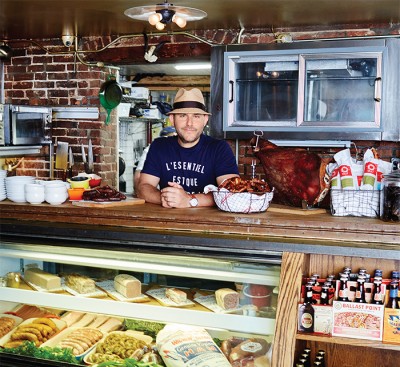
Photo: Winnie Au
Christian Pappanicholas ’98 owns The Cannibal Beer & Butcher (above) and Resto, a Belgian bistro.
The Cannibal Beer & Butcher, owned by Christian Pappanicholas ’98, offers its own take on unique. The New York eatery is part butcher shop, part charcuterie-focused restaurant with some 450 beers from around the world, and part bike shop with tires, water bottles, and other essential bicycling gear for sale. Pappanicholas is a cycling fan, and he named the restaurant after the moniker of biking legend Eddy Merckx. Pappanicholas says the restaurant is a bike-friendly place, where bicyclists can go after a ride to grab a beer and a bite. Bikes can be stored in the racks located in back of the restaurant, where customers also will find a garden seating area. For those wearing their biking gear, the beer is buy one, get one free.
Pappanicholas loves to watch patrons carrying their rides through the restaurant. “It creates a conversation,” he says. “It makes it fun.” Cycling events are often on the TV, and The Cannibal even sponsors a cycling team of 60 riders. All these efforts have created a loyal clientele. “It’s a brilliant community of people,” says Pappanicholas.
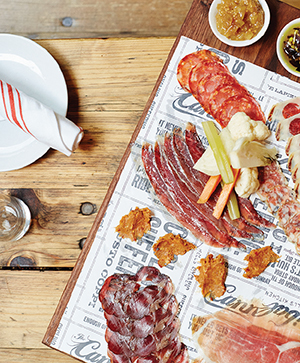
Photo: Winnie Au
The Cannibal
Like others, Pappanicholas grew up in the food industry. His father was co-owner of a pair of Greek restaurants, first the Ivy Stone and later T’Adelphia, in Newark, Del. He remembers sitting on a milk crate and wrapping potatoes in tinfoil with his cousin, Nick. Pappanicholas was 6 or 7 at the time, and for every box of potatoes he went through, he received a dollar. “That was one of my first memories,” he says. Through the years, he performed every job from busboy and dishwasher to line cook and manager “It was a family business,” he says. “We pitched in as much as we could.”
After graduating from Babson, he worked at a real estate firm for five years, but not sure what the future held there, he turned back to food. He attended The French Culinary Institute (now the International Culinary Center) and took a series of jobs managing restaurants before opening Resto, a Belgian bistro, in 2007. The Cannibal followed in 2011, and it now has a satellite location in a Manhattan market. Another Cannibal location in Culver City, Calif., is set to open this fall.
As a veteran restaurateur, Pappanicholas enjoys the reciprocity that happens among restaurant owners. If they need a plumber or a better pig, they call each other. If an employee isn’t quite clicking, they may send him or her to an eatery that’s a better fit. And with millions of people streaming into New York City every day, they don’t fight over customers. They recommend each other’s restaurants. “You come to New York, you don’t go to Zagat’s,” Pappanicholas says. “You come to me. I’ll tell you where to go. I’ll make the reservations for you.”
Good as the Last Plate
Once a restaurant is up and running, consistency becomes key. “It goes live every day,” says Casa Lever’s Guarducci. “It is very comparable to a theater show. Every day, you have to perform.” That means that everyone on the team must be kept motivated. “A bad waiter can make a great dish forgettable,” Guarducci says. “You can only grow if you surround yourself with people who are inspired.”
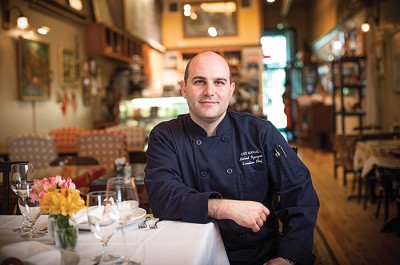
Photo: Tom Kates
“Cafe Mangal is a true family business,” says co-owner and executive chef Mehmet Ozargun ‘02, “and we have put so much hard work into it as a family.”
At Wellesley’s Cafe Mangal, a Mediterranean restaurant with an emphasis on Turkish cuisine, co-owner and executive chef Mehmet Ozargun ’02 has a number of employees who have worked with him for years. Every Saturday night after the restaurant closes, he cooks dinner for all the employees to show his appreciation. “It’s pretty late at night,” he says. “We chat and eat.”
The core staff of the restaurant is a constant. Ozargun oversees everything related to the kitchen, while his father, Omer, handles bookkeeping. His mother, Berna, and long-time manager Gul Bahceci run the front of the house. Bahceci has worked alongside the Ozarguns for 14 years. “She is like a family member,” Ozargun says. “She is like my parent’s daughter.” Ozargun’s brother, Evren ’99, isn’t involved in the day-to-day operations, but he acts as an outside consultant, chiming in on big decisions and dining at the restaurant to offer feedback. Together, the core staff members keep the cafe humming. “I respect their opinions,” Ozargun says. “I learn from their wisdom.”
Originally from Istanbul, Ozargun and his family moved to the U.S. in 1998 and immediately began investigating possible business opportunities. They pondered opening a rug store or a gift shop but settled on a coffee and tea house, following in the footsteps of Ozargun’s great-great-grandfather in the late 1800s. “He used to own the most famous pastry shop in the heart of Istanbul,” Ozargun says. “I guess it is in our genes.”
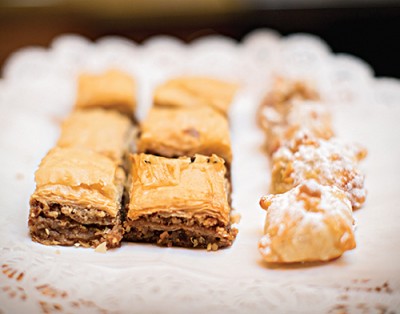
Photo: Tom Kates
Cafe Mangal specializes in Turkish food, a cuisine that is not well-represented in the U.S., says Mehmet Ozargun.
Cafe Mangal opened in 2000 when Ozargun was a sophomore at Babson, and, every day for lunch, he came over from campus to help out. During summer vacations, he traveled to Istanbul to work in the city’s restaurants. He also took cooking lessons and later went to Johnson & Wales University for restaurant management.
Through the years, Cafe Mangal has transitioned. When it opened, the restaurant served breakfast and only a light lunch. Today, it serves a full lunch and then closes for a spell, as candles are brought out and white linen replaces the Turkish head-scarves that serve as lunchtime tablecloths so the restaurant can reopen for fine dining at dinner. Ranked by Zagat as the seventh-best restaurant in the Boston area, Cafe Mangal serves contemporary and traditional menu items, though some concessions are made for American palates. At lunch, for instance, the garlic is toned down for people heading back to work.
Despite the restaurant’s success, Ozargun and the staff don’t stand still. “It’s the food business,” he says. “You’re only as good as your last plate.” They might change the menu or paint the walls a new color, and Ozargun visits other restaurants for ideas, checking out not only the food but also such details as glassware, music, and even the bathrooms.
As with all the alumni restaurateurs, Ozargun finds the cafe a commitment that never ends. “We put so much hard work into the restaurant and have sacrificed a lot during the last 15 years,” he says. “It is literally our second home.” At the end of a long day, he might go into the dining room, where paintings and family pictures hang on the wall, and talk to customers, many of whom are regulars. “Sometimes you’re so tired at the end of the day,” he says. “But then I talk to customers. That takes everything away.”
